




 |
   |
 |
|
Bröselmaschine Brothers Lelia Broussard Al Brown |
Ian Brown Pete Brown & Piblokto! Sam Brown |
Duncan Browne Severin Browne The Browne Bunch |
Jack Bruce Michael Bruce Brunettes |
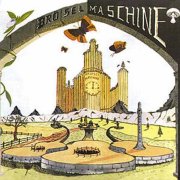 |
Bröselmaschine (1971, 35.46) ***½/½GedankenLassic Gitarrenstück The Old Man's Song Schmetterling Nossa Bova |
Current availability:
Mellotron used:
The sole Bröselmaschine album is a bit of an oddity; for the first few tracks, I was convinced that a mispressing had delivered an English folk record to me by mistake. The style was correct, the English-language vocals were unaccented; Schmetterling even borrows from the same source as Jimmy Page's White Summer. In fact, the only obviously Germanic influence anywhere on Bröselmaschine is the muttered German narration on the track, in amongst the sitars and open-tuned acoustics.
There's hardly any Mellotron on the album at all; a few string chords from Mike Hellbach in Schmetterling and that's it, as the flute parts are real. This is obviously a stoner's delight, like quite a few German albums of the era (Wind's Morning and Witthüser & Westrupp's Der Jesuspilz/Musik Vom Evangelium spring to mind) and is actually a very good record, but don't bother for the Mellotron.
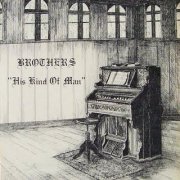 |
His Kind of Man (1977, 35.47) **½/T |
|
| His Kind of Man People Open Your Eyes Road to a New Life Listening Gentle Rain The Modern Man I've Got a New Song You're So Good to Me |
Thankin' You Lord You Can't Get There From Here |
|
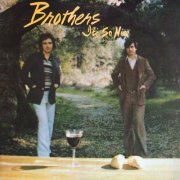 |
It's So Nice (1978, 34.10) **½/TTSon of God Son of ManSynthetic Generation Forever Lord It's So Nice Glory Suite Psalm 19 Signs The Triumph Micah 5:2 & Fulfillment |
Current availability:
Mellotrons used:
Michael Schneider and James Kramer were Brothers, albeit only in the Christian sense. Their two late '70s albums consisted of Christian soft rock, complete with weird, almost subliminal, tippy-tappy drums, when they're present at all. Other, overly optimistic listeners have detected hints of psychedelia in their sound, which strikes me as a classic case of wishful thinking. 1977's His Kind of Man is at its least insipid on The Modern Man, You're So Good To Me and You Can't Get There From Here, all of which utilise Schneider's snaky synth lines to lift them above the album's default blandness. Schneider plays Mellotron, with background strings on the opening title track, People Open Your Eyes and I've Got A New Song, presumably intended to hint at real ones.
The following year's It's So Nice is marginally gutsier than its predecessor, which isn't really saying very much. Better tracks? The one/two of Glory Suite and Psalm 19, where the duo almost rock out, while closer Micah 5:2 & Fulfillment hints at prog in its middle section. Schneider does slightly more with the Mellotron this time round, with cellos on the cheesy Forever Lord and The Triumph, doubled cellos and flutes on Glory Suite, unusually upfront strings on Psalm 19 and background ones, as on His Kind of Man, on Micah 5:2 & Fulfillment. These can be found as downloads if you really feel the need.
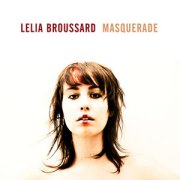 |
Masquerade (2010, 38.05) **/T½ |
|
| Masquerade Satellite Shoot for the Moon Spiderwebs Armor on My Heart You're Not Fooling Anyone Heart Collectors Rosey |
Something True Hipster Bitch |
|
Current availability:
Mellotron/Chamberlin used:
Lelia Broussard's third album, 2010's Masquerade, is a pretty typical pop-end-of-singer/songwriter effort, making for a fairly unpalatable listen to those accustomed to music with a little more... substance. Admittedly, the mournful brass on Armor On My Heart and You're Not Fooling Anyone stands out, but most of the album's contents are run-of-the-mill, slightly countryish pop/rock that's really only going to appeal to a 'background listening' audience dynamic. Given that the lyrics in this kind of stuff assume a high level of importance, are any of them actually worth hearing? Maybe closer Hipster Bitch, which is at least vaguely amusing, not to mention one of the album's more listenable tracks, but otherwise, it's the usual run of love lost/love won, I'm afraid.
Dan Romer plays Mellotron and Chamberlin, with what sounds like a Chamby string line on opener Masquerade and Mellotron flutes on Rosey, although all brass parts appear to be real. Do you want or need to hear this? I don't think so, no.
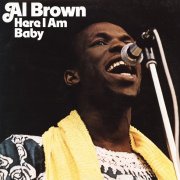 |
Here I am Baby (1974, 37.50) ***/TT |
|
| Listen to the Music Loving Arms Love and Happiness I've Got to Go Without You Are You Thinking of Him Here I am Baby For the Good Times Quick, Fast, in a Hurry |
Girl in His Mind Up From the Ghetto |
|
Current availability:
Mellotron used:
To my knowledge, Al Brown only ever released the one album, 1974's Here I am Baby, although he's had a run of singles from 1970 up to the present day. The album displays a variety of styles (albeit all recognisably reggae), surprising us with its opening take on The Doobie Brothers' Listen To The Music, probably at its best on Love And Happiness and closer Up From The Ghetto.
Producer Geoffrey Chung plays Mellotron, amongst other instruments, with exceedingly upfront strings and flutes on Loving Arms and less in-your-face ones on For The Good Times and Quick, Fast, In A Hurry. Worth it for the Mellotron tracks? Possibly Loving Arms.
Arthur Brown (UK) see: |
 |
Arthur Brown's Kingdom Come (UK) see: |
 |
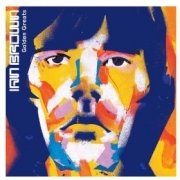 |
Golden Greats (1999, 44.58) ***/T½ |
|
| Gettin' High Love Like a Fountain Free My Way Set My Baby Free So Many Soldiers Golden Gaze Dolphins Were Monkeys Neptune |
First World Babasonicos |
|
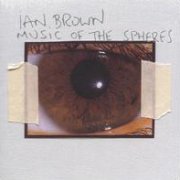 |
Music of the Spheres (2001, 41.09) **½/TT |
|
| F.E.A.R. Stardust The Gravy Train Bubbles Hear No See No Northern Lights Whispers El Mundo Pequeño |
Forever and a Day Shadow of a Saint |
|
Current availability:
Mellotrons used:
Ian Brown's amusingly-titled second solo album, Golden Greats, seems to be attempting to carry on the sound pioneered by The Stone Roses, most of the album's material having a psychedelic dance/rock feel to it, not a million miles away from the band that made him famous. Opener Gettin' High sets Brown's stall out well, with its programmed drums, psych riffing and sitar, while Love Like A Fountain is more straightforward rave/rock, most of the other tracks veering somewhere between these two styles, taken at a faster or slower pace. The bonus tracks on the US version aren't worth the effort: a 'yeah, whatever' version of Love Like A Fountain and a dance remix of Dolphins Were Monkeys, involving two Brown collaborators, U.N.K.L.E. and South. Tim Wills plays Mellotron, with nicely up-in-the-mix string and flute parts on Set My Baby Free and strings on So Many Soldiers. Given Brown's considerable Oasis connection, might it be one of their machines? Who knows.
Brown followed up, two years later, with Music of the Spheres (cue 'load of old balls' joke...). To be honest, it's less engaging than its predecessor, as if Brown had used up his best ideas (let's face it, it happens...). More Mellotron than before, though, player unknown, as it could be any of Dave McCracken, Mark Sayfritz or Robin Taylor-Firth. Anyway, phased strings on Stardust, regular ones on Northern Lights and wavery, echoed flutes on Forever And A Day, all nice to hear, if slightly inessential.
See: John Squire
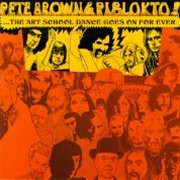 |
Things May Come & Things May Go, But the Art School Dance Goes on Forever |
|
| Things May Come & Things May Go, But the Art School Dance Goes on Forever High Flying Electric Bird Someone Like You Walk for Charity, Run for Money Then I Must Go and Can I Keep My Love's Gone Far Away |
Golden Country Kingdom Firesong Country Morning |
|
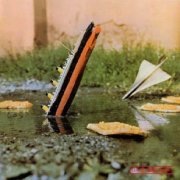 |
Thousands on a Raft (1970, 52.10) ***½/TAeroplane Head WomanStation Song Platform Two Highland Song If They Could Only See Me Now parts I & II Got a Letter From a Computer Thousands on a Raft |
Current availability:
Mellotrons used:
Pete Brown is known chiefly as sometime lyricist for Cream, putting words into Jack Bruce's mouth on I Feel Free, White Room etc. After their split, he got his own outfit together, Pete Brown's Battered Ornaments, recording one album with them, A Meal You Can Shake Hands With in the Dark, before the rest of the band sacked him just before they played Hyde Park with the Stones (and, of course, King Crimson). Wasting no time, he formed Piblokto! releasing (deep breath) Things May Come & Things May Go, But the Art School Dance Goes on Forever within the year. Despite being optimistically described as 'one of the finest of the progressive era', it's a fairly typical slice of organ-driven proto-prog, with Pete's mad vocals as a bonus. While not bad, it'd be stretching it a little (OK, a lot) to call it a 'classic'; it certainly doesn't stand out from the pack, going by the contemporaries of the band that I've heard. One Mellotron track (from organist Dave Thompson?), with some orchestrally-inclined strings on High Flying Electric Bird (also the b-side of their first single, the non-album Living Life Backwards).
Later the same year, their second and final album, Thousands on a Raft, appeared, breaking Brown's run of ridiculously lengthily-titled albums. In case you're wondering, aside from the Titanic and Concorde, the sleeve depicts several slices of beans on toast floating in a pond (not sure how they managed that), the album title apparently being cockney (non-rhyming) slang for the aforementioned culinary delicacy. Several band members had changed in the months between the two records, the fresh blood making their presence felt immediately, as opener Aeroplane Head Woman's Cream-like tones assault your speakers. After a piano ballad, Station Song Platform Two, the album goes completely bonkers, with the seventeen-minute, semi-improvised Highland Song, followed on side two by If They Could Only See Me Now Parts I & II, which is almost as long. Mellotron (definitely Dave Thompson this time round) on Station Song Platform Two, with some pleasant background MkII strings.
Do you buy these albums? Well, the over 2½ hour set is worth the dosh if you're into lesser-known UK bands of the era, while some of the music's well worth hearing. The two Mellotron tracks are less than essential, though both quite nice. Up to you. Incidentally, BGO's 2-CD set of these albums confuses the issue greatly by adding a total of eleven bonus tracks, spread over both discs, but as Pete requested, puts them in chronological order. Disc 1 starts with three bonus tracks, including their first single, with more between the two albums (Thousands... is irritatingly split between the discs), finishing with several more at the end. Pete is occasionally to be seen wandering around Crouch End in north London, sometimes muttering to himself, though surely his royalty cheque for the inevitable live album from the recent Cream reformation should boost his bank balance slightly?
See: Cream | Jack Bruce
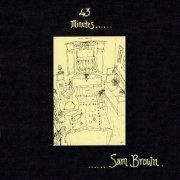 |
43 Minutes... (1993, 43.38) ***½/½ |
|
| Come Into My World Into the Night In the Rain Fear of Life Morning Song You Are the World See This Evil Your Time is Your Own |
One Candle Letting Go Sleep Like a Baby |
|
Current availability:
Mellotron used:
Sam Brown is a part of what could probably be described as 'UK rock dynasty no. 2' (no. 1 being the Marty/Kim/Ricki Wilde axis), her parents being original '50s Larry Parnes-era rocker Joe and session singer Vicki Brown. Sam apparently first sung professionally at the age of twelve and was recording regularly by the early '80s, kicking her solo career off with her most commercially successful album, 1988's Stop! 1993's 43 Minutes... was her third release, informed by her mother's death from cancer and deemed 'uncommercial' by her record company, eventually self-released by Brown on her own Pod Music imprint (later reissued on A&M).
By the standards of mainstream female singer-songwriter territory, it's a pretty uncompromising effort, bearing comparison with both Kate Bush and Heart, the latter chiefly in the vocal department (lazy comparisons, eh - don'cha just love 'em?). Most tracks feature massed Bush-like backing vocals and Brown's piano work, skipping between styles with abandon, touching on pop, balladry, jazz and more interesting territory. Best track? Maybe opener Come Into My World, although little here made me cringe. Brown plays 'Melotron' on one track, with indistinct background flutes on the dying seconds of Fear Of Life, really only notable for being an early British example of the instrument's resurgence in the '90s.
43 Minutes... is an awful lot better than I'd expected, although much of it's not especially to my taste. Sam went on to sing live with Pink Floyd and release several more solo albums alongside sessions and working with her dad, although her hardcore fans tend to rate this as her best work. Next to no Mellotron, mind, but that isn't why you might want to hear this record. A quick odd fact regarding Brown's album titles: rather in the way that the Kings of Leon's album titles all contain five syllables, the initial letter of Sam's spell out her name (up to 'O' so far). She claims to have been unaware of the oddity until after her fifth release, but now seems keen to complete the set.
See: Pink Floyd
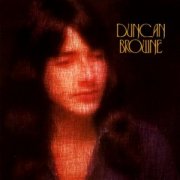 |
Duncan Browne (1973, 42.37) ****/T½ |
|
| Ragged Rain Life Country Song The Martlet My Only Son Babe Rainbow Journey Cast No Shadow Over the Reef |
My Old Friends Last Time Around |
|
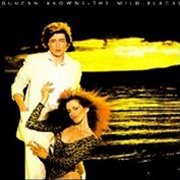 |
The Wild Places (1978, 41.26) ***/TThe Wild PlacesRoman Véce Camino Real (parts 1, 2 & 3) Samurai Kisarazu The Crash Planet Earth |
Current availability:
Mellotrons used:
Duncan Browne appeared in the mid-'60s, releasing his debut, Give Me Take You (****), in 1968, taking several years to follow it with 1973's Duncan Browne, largely due to his somewhat uncommercial stance and hassles with his label, Immediate. It's an excellent little album, fitting pretty well into the folky singer-songwriter area prevalent at the time; comparisons with Al Stewart and possibly Gordon Giltrap aren't too far off the mark, maybe even Richard Thompson in places. Browne's classically-based guitar work, as much as his songs are what makes him stand out from the pack, along with the occasional unusual arrangement, such as the synth part on Last Time Around. As for the album's Mellotron use (from ubiquitous sessioneer John "Rabbit" Bundrick), the various strings on Ragged Rain Life sound real, but that's full-on Mellotron strings on Country Song, with less of the same on The Martlet. I think Babe Rainbow's strings are, again, real, but he sticks some more Mellotron in amongst the synth swoops and proto-bass pedalisms of Last Time Around. All in all, this is a very good album indeed; I can't believe it's taken me this long to discover it (thanks, Joe!).
After another several-year gap, Browne released The Wild Places in 1978 on small UK label Logo, alongside concurrent releases from his almost-successful band, Metro. I've seen it unpromisingly described as 'new-wave melodic'; a better description would be 'slightly fusionesque late-'70s singer-songwriter' - snappy, eh? It's not a bad album, although Browne's songs are frequently subsumed under unsympathetic arrangements of the type fashionable at the time amongst studio pros; I can imagine the title track done in the style of his previous album and it would be a lot better. Of his three supporting musicians, two were Metro members (bassist John Giblin and über-drummer Simon Phillips), with another major session dude, Tony Hymas, on keys, including a smattering of Mellotron, with background choirs on the title track and an obviously-Mellotronic flute line on Kisarazu, complete with pitchbend. Overall, the material's OK, but compared to his earlier work, this is something of a disappointment. The cringeworthy cover pic's the giveaway here; I mean, would YOU buy this album? Mind you, I picked it up at the same time as a James Last LP (you sick man!), making it appear quite tasteful in comparison.
I think Duncan Browne will be a grower; his debut's excellent, too. After a lengthy period working in the film scoring business, Browne had just finished recording a new album, Songs of Love and War, in 1993 (sampled Mellotron on a couple of tracks), with help from Steve Hackett's old keyboard player, Nick Magnus, when tragically, he died of cancer. As for Duncan Browne, pick it up if you see it; the bonus tracks are good, though Mellotron-free. The Wild Places has its moments, as does its follow-up, '79's Streets of Fire (***), but don't go too far out of your way for them.
See: Samples etc.
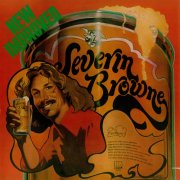 |
New Improved Severin Browne (1974, 32.54) **½/T |
|
| Love Notes From Denver Tickle My Lips Romance More Dreams in the Sea Confessions of a Madman Love Song The Sweet Sound of Your Song Do, Magnolia, Do |
Cooking School Beginning to Believe |
|
Current availability:
Mellotron used:
German-born, American-raised Severin Browne is probably best known as the elder brother of the slightly better-known Jackson, although both he and their father are/were songwriters in their own right. As one of the first white artists signed to Motown, Browne found himself slightly adrift, eventually making two albums for the label, who were more interested in him as a writer, anyway. The second and last was 1974's New Improved Severin Browne, a fairly typical-for-the-era poppy singer-songwriter effort, which means it hasn't dated too well, lowpoints including the cod-calypso of Romance and most of the balladry.
Alan Lindgren plays Mellotron, with strings on Cooking School and possibly Love Song, the rest of the album's strings being real. The best this album gets is sounding slightly like CSN&Y, although John Denver might be a better comparison. Harmless, but all rather unexciting.
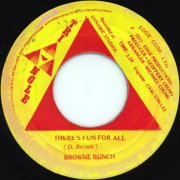 |
7" (1973) ***/T There's Fun for All Something Silly |
Current availability:
Mellotron used:
The Browne Bunch were also known as The Brownie Bunch, Browniebunch, Brownies' Bunch and doubtless other variations on the theme. They released a handful of singles in the '70s, '73's There's Fun For All possibly being the first. It's a relatively upbeat number, as against the prevailing 'soulful' style used by so many genre artists, although the flip, Something Silly, reverts to type.
Someone plays distant Mellotron strings on the flip, possibly Manfred Mann's MkII, by that point residing at London's Chalk Farm Studios, I'm told. Was this recorded there? Was it an overdub? Was it a different Mellotron in a different location entirely? Either way, if you want to hear this, it's on Dub Store's Geoffrey Chung Reggae Soul Singles 1973-1974.
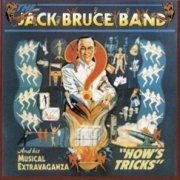 |
How's Tricks [as The Jack Bruce Band] (1977, 41.12) ***½/TT |
|
| Without a Word Johnny B '77 Times Baby Jane Lost Inside a Song How's Tricks Madhouse Waiting for the Call |
Outsiders Something to Live for |
|
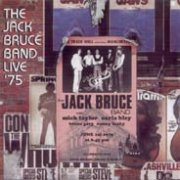 |
Live '75 [as The Jack Bruce Band] (2003, 111.08) ***½/TT½Can You Follow?Morning Story Keep it Down Pieces of Mind Tickets to Waterfalls/Weird of Hermiston/Post War Spirit One/You Burned the Tables on Me Smiles and Grins Sunshine of Your Love |
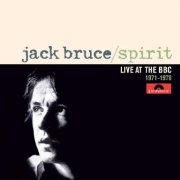 |
Spirit: Live at the BBC 1971-1978 (2008, 216.47) ***½/TT½ |
|||
| You Burned the Tables on Me Smiles and Grins Folk Song A Letter of Thanks We're Going Wrong The Clearout Have You Ever Loved a Woman? Powerhouse Sod You Sure Look Good to Me |
Jack's Gone Clearway Powerhouse Sod Can You Follow? Morning Story Keep it Down Pieces of Mind One Spirit |
Without a Word Smiles and Grins Fifteen Minutes Past Three Ten to Four Madhouse Without a Word Times Baby Jane Born Under a Bad Sign |
Lost Inside a Song Something to Live for How's Tricks Spirit Out Into the Fields You Burned the Tables on Me Twenty Past Four |
|
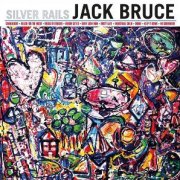 |
Silver Rails (2014, 47.30) ***/½ |
|
| Candlelight Reach for the Night Fields of Forever Hidden Cities Don't Look Now Rusty Lady Industrial Child Drone |
Keep it Down No Surrender! |
|
Current availability:
Mellotrons used:
I'm sure you all know exactly who Jack Bruce is and who he's played with (Cream, West, Bruce & Laing et al.), so I won't insult you by going over it all again. Anyway, 1977's How's Tricks was Bruce's fifth solo album, mixing jazz (and lots of it), blues and rock together into a not entirely unappealing stew, although the pure blues of Waiting For The Call is probably slightly unnecessary. Highlights include one of the rockier efforts here, Madhouse and the mad funk/fusion of Outsiders. Tony Hymas on Mellotron, with a superbly-played string part on opener Without A Word and more strings on Lost Inside A Song and closer Something To Live For, albeit not enough to make this essential on that front.
2003's Live '75 apparently fills a gap in his discography, being a document of an excellent band that never made it to the studio, making it invaluable to hardcore fans of the man. To the rest of us, it's actually quite difficult to pigeonhole, which is probably a good thing, although it doesn't make the reviewer's job any easier. 'Jazzy mid-'70s rock' sort of covers it, though without really describing it very well at all; maybe 'middling rock with jazz, blues and soul influences' would do? Suffice to say, it's the sort of music that was comprehensively wiped out by punk's Year Zero, for better or worse (delete according to taste). Bruce was in good voice in Manchester that night, his band including names such as recently ex-Stone Mick Taylor and celebrated jazzer Carla Bley, playing mostly material from the three solo albums he'd released up to that point, with only one from his Cream days. The playing is excellent throughout (no surprise there, then), although some of the arrangements are drawn out beyond the point of undivided attention, particularly the twenty-three minutes of Smiles And Grins.
Along with Hammond, Rhodes, clavinet and Moog, Bley provides all the album's Mellotron work (all string section substitutes, I suspect), although I'm unaware of her having used one before or since. The excellent Morning Story has a delicate Mellotron part that lifts an already good song, while Tickets To Waterfalls has little bursts of it amongst her organ work, leaving a few chords here and there on the One/You Burned The Tables On Me medley and a fairly lengthy part on the even more lengthy Smiles And Grins. While a goldmine for Bruce fans, the rest of us may find much of Live '75 hard going, although it's introduced me to several good songs of which I'd previously been unaware. Bley's Mellotron work is never less than tasteful and, by and large, quite minimalist.
2008 brought a mammoth three-CD set, Spirit: Live at the BBC 1971-1978, containing no fewer than five separate recordings with as many different bands in several different styles. Disc one comprises two different 1971 broadcasts, one with Jon Hiseman (Colosseum) on drums, one with Bruce's old mucker Graham Bond on organ, sax and vocals, though sadly, not Mellotron. Disc three's '77 concert has a similar lineup to How's Tricks, with three lengthy (and very jazzy) improvs from a '78 set spread over discs two and three that are, to be frank, a bit of an endurance test. That leaves the '75 Old Grey Whistle Test set that comprises the bulk of disc two, recorded with (I think) the same lineup as Live '75 - certainly with Carla Bley on keys, anyway. It's not a dissimilar set to that album, albeit with far less jamming (thankfully), only adding one Mellotronic track, Without A Word, with strings throughout. Bley adds the strings to another four tracks, Morning Story, One, Spirit and Smiles, though none to the same degree. Tony Hymas adds Mellotron strings to the same three tracks on disc three's set as he does to the studio versions, so nothing you haven't heard before, but nice to hear them done live.
2014's Silver Rails brings Bruce's first studio Mellotron use in well over three decades, on an album that's... typically Jack Bruce in its mix of soulful, jazzy rock and more eclectic material. Guests include Robin Trower, Bernie Marsden (obvious on Keep It Down), ex-Scorpion Uli Jon Roth, drummer Cindy Blackman Santana and our old friend John Medeski, plus a slew of the expected top sessioneers. Although most of the album falls into the above description, exceptions include the dark Hidden Cities, featuring Roth's unmistakeable guitar tones, the growling Drone (in 11/8, time signature fans) and Cream-esque closer No Surrender! Best tracks? My vote is for affecting ballad Industrial Child, but the variety on offer will most probably lead to there being as many fêted tracks as there are on the record. Bruce plays most of the Mellotron work here, with background strings on Reach For The Night and No Surrender! (although nothing obvious on Keep It Down), while Medeski (who also plays Hammond on several tracks) gets in on the act with, er, more background strings on Don't Look Now.
See: Cream | Spectrum Road
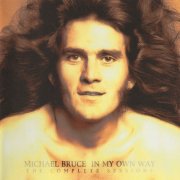 |
In My Own Way: The Complete Sessions (2002, recorded 1974-5, 125.31) ***/T½ |
|||
| King of America Lucky Break Friday on My Mind In My Own Way As Rock Rolls on If the Sky Should Fall So Far So Good Gotta Get Hold |
Seems Like I Only Fool Myself [Complete Sessions adds: Morning Song As Rock Rolls on (alt.) If I Was King Oh My Love Nothing on Earth As the World Turns on |
Love's Opened Up My Heart I Kicked Da Blues Someone Like You I Can't Leave You No-One Knows the Stranger In My Own Way (alt.) Got to Get Hold Love Love Love |
Morning Song Feeling Like I'm Somebody Else Something in This Life When You're on the Outside Ain't That Just Life Life Will Be Our Music So Far So Good Lucky Break] |
|
Current availability:
Mellotron used:
Michael Bruce was, of course, one of the two guitarists in the original Alice Cooper, before the name became Vince Furnier's nom-de-plume. It's difficult to work out exactly what happened to the band in 1974, after the disastrous Muscle of Love (**), but one report I've read states that various members made solo albums, their erstwhile vocalist's Welcome to My Nightmare being, unsurprisingly, the most successful. Bruce recorded a handful of tracks with noted producer Jack Douglas (Aerosmith, a million others), going on to record a complete album the following year, which crept out in a couple of overseas territories as In My Own Way (tracks 1-9 here), only gaining a full(-ish) release some twenty years later.
2002 brought a much-expanded reissue, In My Own Way: The Complete Sessions, giving us all a chance to hear what Bruce had laid down nearly thirty years previously. And... it's a rather dull, mid-'70s mainstream rock album, to be brutally honest. I know this kind of stuff was big at the time, but after the excellent (if a tad off-Broadway) work Bruce made with the Cooper group, this is, frankly, a bit limp, material such as King Of America, Lucky Break and If The Sky Should Fall sounding more like, say, Elton John's contemporaneous work than anything more potent. Any highlights? The energetic As Rock Rolls On (featuring a guest spot from Alice himself) and a passable version of Slade's So Far So Good are decent enough; rather slim pickings, to be honest. On top of the original nine tracks, disc one adds the four Douglas recordings, while the second disc gives us the band's Lake Tahoe sessions, recorded between the Douglas tracks and the official release. While it might be pushing it to say that the cornucopia of extra material especially enhances the original album, disc two gives us rockier efforts such as Got To Get Hold, Love Love Love and Something In This Life, while the seven-minute No-One Knows The Stranger at least manages to be slightly epic.
Although there's no Mellotron to be heard on the original album, someone (most likely Bob Dolin, also live keys man with the Cooper group) plays it on Oh My Love, one of the band's four Douglas recordings, with string and cello parts dipping in and out of the mix, ending with a lovely flute coda. Disc two brings more (admittedly rather murky) Mellotron, string parts enhancing the demo version of the title track and When You're On The Outside. Hardly enough to make a purchase worthwhile on those grounds alone, but nice to hear should you be enough of an Alice fan to feel you need to own this.
See: Alice Cooper | Ant-Bee
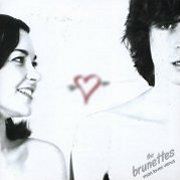 |
Mars Loves Venus (2004, 36.06) **½/T |
|
| Mars Loves Venus Loopy Loopy Love Polyester Meets Acetate Too Big for Gidget Whale in the Sand You Beautiful Militant The Record Store These Things Take Time |
Best Friend Envy No Regrets Leonard Says Your Heart Dies |
|
Current availability:
Chamberlin used:
On their second album, 2004's Mars Loves Venus, New Zealand duo (plus drummer) The Brunettes' style of choice was pre-psych '60s-influenced indie, their male/female vocal interplay and occasionally witty lyrics their strongest suits. Best tracks? Probably the waltz-time Too Big For Gidget and closer Your Heart Dies, while The Record Store might just be the album's best lyric.
James Milne plays Chamberlin, with a string line and a handful of chords on You Beautiful Militant, although other string parts sound like, er, something else. Their follow-up, 2007's Structure & Cosmetics, credits Mellotron, although it fairly obviously isn't. Can we trust the Chamby use here? Who knows? Not that interesting, then, if truth be told, but better than its successor.
See: Samples etc.